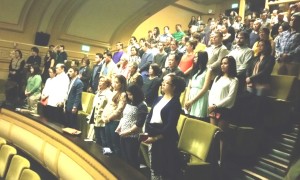NEW YORK CITY—President-elect Rodrigo Duterte is now also the panderer-in-chief-elect. He declares that he wishes to unify the country. Bravo!
But how exactly does burying Ferdinand Marcos, a bogus war hero, a dictator, notorious violator of human rights and plunderer (make that plunderer-in-chief) of the nation’s treasury, at the Libingan ng Mga Bayani (Heroes Cemetery) unify an archipelago of 7,000 islands? Au contraire, the howls of outrage heard distinctly not just from the island populace, but also from the diaspora argue the exact opposite.
Duterte says that the late tyrant is a hero to all Ilocanos. Really? I know quite a few who grimace in disgust at the mere mention of his name—and an even bigger grimace when his widow is alluded to.
He’s backtracked a bit, admitting that Marcos may not have been a hero but that he still should be buried there, as he was a soldier. By this flawed logic, all dead soldiers should then be buried there as well, even setting aside the fact that the cunning dictator spent more time fabricating a heroic past than actually fighting the Japanese.
Perhaps Duterte does this to confound us, keep us off-balance—say one thing, do another—the equivalent of the drunken-master style of kung fu popularized in cinema. Maybe, but this ain’t the movies.
Or perhaps, as a friend once put it, it’s his sense of mischief. But there is mischief, and there is mischief. It seems to me this is mischief of a different order. Duterte is not by any stretch of the imagination the mischievous but wise monkey king journeying west to retrieve Buddhist sutras, playfulness disguising his state of enlightenment. Duterte’s mischief is simply malevolent.
Nor is he Mark Anthony, uttering those famous lines, “I come to bury Caesar, not to praise him.” In this instance, burying the late dictator where his family insists that he be interred is to praise him, his actual record and the judgment of history be damned. Unless Duterte has a relationship to the Marcos family unbeknownst to the public. There is certainly nothing in it for the nation, except as a grievous insult to the dead rightfully buried there and to the multitudes who died and the thousands who suffered when martial law was in place. And, being elected to a single six-year term, he doesn’t need the Ilocano vote. So what is in it for him?
For someone who supposedly delights in upsetting the establishment, what could be more establishment than acceding to the wishes of one of the country’s wealthiest (if not the wealthiest) families as well as a politically powerful clan—a clan that we all thought would be yesterday’s news but has in fact come back strong, like weeds that keep cropping up in a garden that hasn’t been properly tended to.
On the other hand, it is entirely possible that Duterte, deep down, does think Marcos is a hero, though he hasn’t said so plainly, which is a surprise for a supposedly plain-speaking politician—though I am acutely aware that the latter phrase is an oxymoron. Could Duterte’s intent be a ploy, using the late Marcos’s constituency as a proxy for his true feelings? After all, what he proposes to do the late dictator already did. With disastrous results. Eliminate suspected criminals? Been there, done that. Abolish or suspend Congress? Been there, done that, in its place a rubber-stamp parliament.
Does Duterte propose to rule by decree? Been there, done that.
Here is another man who wishes to be king, the datu of all datus, one who will brook no opposition. His act might have worked well in Davao City, but the country is a vastly bigger stage. What plays well locally—and his record in Mindanao’s premier city may be more hype than reality—doesn’t necessarily transfer successfully to the national stage.
The nation might wake up and realize that the would-be emperor has no clothes. I hope (against hope) that this realization comes sooner rather than later.
Copyright L.H. Francia 2016


